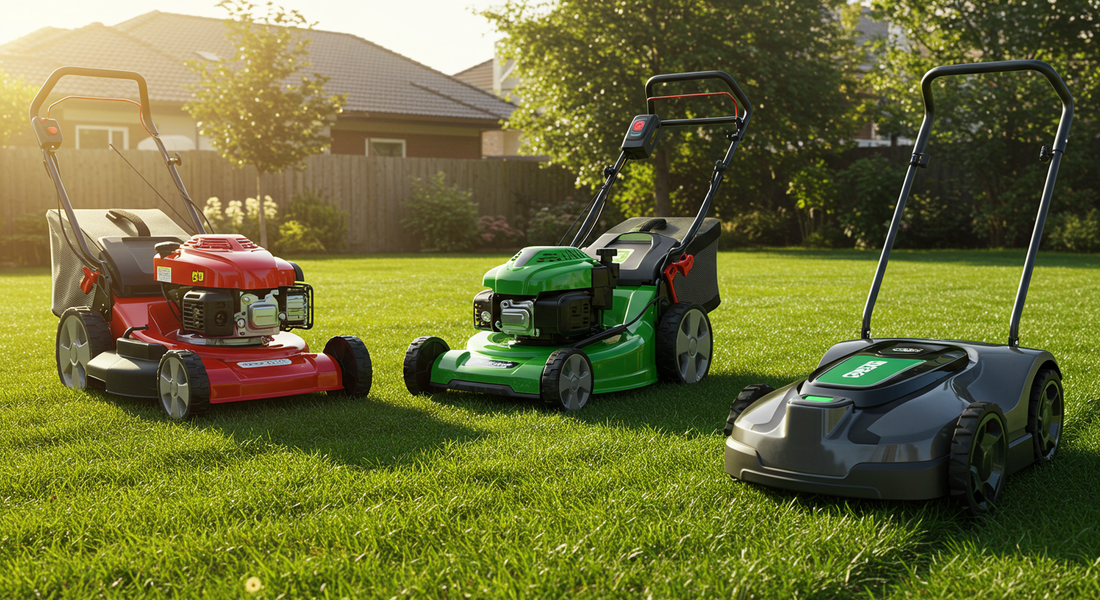
Gas vs. Electric vs. Robotic: How to Choose the Perfect Lawn Mower for Your Yard
Share
A perfectly manicured lawn is the pride of any homeowner, but achieving that pristine look depends heavily on one crucial tool: the lawn mower. Gone are the days of a single, one-size-fits-all solution. Today, the landscape of lawn mowing technology is evolving rapidly, presenting a diverse range of options from powerful gas engines to silent electric models and even fully autonomous robotic mowers.
Making the right choice can transform lawn care from a weekend chore into a satisfying, efficient task. This guide will walk you through the different lawn mower types, compare their strengths and weaknesses, and ultimately help you answer the question: how to choose a lawn mower that is perfect for your yard.
The Raw Power: Gas Lawn Mowers
For decades, gas-powered mowers have been the undisputed kings of lawn care, and for good reason. They offer unparalleled power and cutting performance, making them ideal for tackling large, demanding yards.
-
Pros:
-
Maximum Power: Easily cuts through tall, thick, or wet grass.
-
Unlimited Runtime: Simply refill the tank to keep going, with no need to wait for batteries to charge.
-
Durability: Built with robust engines and heavy-duty components for a long lifespan.
-
-
Cons:
-
Noise and Emissions: Significantly louder and produce exhaust fumes.
-
Heavy Maintenance: Requires regular oil changes, spark plug replacements, and fuel stabilizing.
-
Heavier Build: Can be more difficult to maneuver, especially without a self-propel feature.
-
Best For: Homeowners with large yards (over 1/2 acre), challenging terrain with hills, or unusually thick grass varieties.
Key Considerations: Look at engine size (CC), the cutting deck width (wider means fewer passes), and whether you need a self-propelled model to make mowing easier.

The Eco-Friendly Challenger: Electric Lawn Mowers
Electric mowers have surged in popularity, offering a quieter, greener, and lower-maintenance alternative to gas. The primary debate within this category is gas vs electric mower, but the choice also comes down to corded versus cordless models.
-
Corded vs. Cordless:
-
Corded: Lightweight, affordable, and offer unlimited runtime as long as you're plugged in. However, your range is limited by the cord's length, which can be cumbersome to manage.
-
Cordless: The most popular electric option, offering the freedom of a gas mower without the emissions. Battery technology has improved dramatically, providing more power and longer runtimes than ever before.
-
-
Environmental Benefits: They produce zero emissions, making them a much cleaner choice for the environment. Their quiet operation is also a significant benefit for you and your neighbors.
-
Performance and Limitations: While powerful enough for most typical lawns, some models can struggle with very tall or dense grass. Battery life is the main constraint for cordless models, so having a spare battery is often recommended for larger yards.
The Future of Lawn Care: Robotic Lawn Mowers
Welcome to the age of automation. Robotic lawn mowers represent the cutting edge of lawn care, offering a "set it and forget it" solution that keeps your lawn perfectly trimmed 24/7.
-
Cutting-Edge Technology in 2025: Today's models are smarter than ever. They use GPS-assisted navigation to map your yard, advanced AI to avoid obstacles, and weather sensors to mow only in optimal conditions. Many robotic mower reviews praise their ability to handle complex layouts with ease.
-
Smart Features and Automation: Control everything from your smartphone—set mowing schedules, adjust cutting heights, and create no-go zones. They operate so quietly you'll barely notice them, and when the battery is low, they automatically return to their charging station.
-
Cost-Effectiveness and Efficiency: While the upfront cost is higher, robotic mowers save you the most valuable asset: time. They work by trimming a tiny amount of grass frequently, which returns fine clippings to the soil, acting as a natural fertilizer. This "mulching" process leads to a healthier, greener lawn over time with minimal effort.
Comparative Analysis: Head-to-Head
|
Feature |
Gas Mowers |
Electric Mowers |
Robotic Mowers |
|---|---|---|---|
|
Performance |
Highest power, best for tough conditions |
Good power, suitable for most lawns |
Consistent, gentle "mulching" cut |
|
Cost of Ownership |
Moderate initial cost, ongoing fuel & maintenance costs |
Low to high initial cost, potential battery replacement |
Highest initial cost, very low running costs |
|
Maintenance |
High (oil, gas, filters, spark plugs) |
Low (blade sharpening, cleaning) |
Very Low (blade changes, cleaning) |
|
Noise Level |
Very Loud |
Quiet |
Very Quiet |
|
Convenience |
Moderate |
High |
Highest (Fully Automated) |
How to Choose the Best Lawn Mower for You
Selecting the best lawn mower comes down to balancing your yard's specific needs with your personal preferences.

-
Yard Size Considerations:
-
Small (< 1/4 acre): A corded electric or a smaller cordless model is perfect.
-
Medium (1/4 to 1/2 acre): A powerful cordless electric mower or a robotic mower is ideal.
-
Large (> 1/2 acre): A gas mower or a high-end, long-range robotic mower is your best bet.
-
-
Terrain and Landscape Factors: If your yard has steep hills, a self-propelled gas or electric model will save you a lot of effort. For yards with many flowerbeds, trees, and obstacles, a nimble robotic mower with smart navigation can be a game-changer.
-
Personal Preferences and Budget: Do you prioritize environmental friendliness and quiet operation? Go electric. Do you want the ultimate time-saving convenience? A robotic mower is worth the investment. Is raw power your top priority for a tough lawn? Gas remains a reliable choice.
Conclusion: The Perfect Cut for the Future
The right lawn mower is out there for you. By evaluating your yard's size, terrain, and your personal priorities, you can confidently choose a machine that fits your needs.
-
Recap: Gas mowers deliver unmatched power, electric mowers offer a fantastic balance of performance and eco-friendliness, and robotic mowers provide the ultimate hands-free solution for a perpetually perfect lawn.
The future of lawn mowing is undoubtedly smarter, quieter, and more automated. As battery technology improves and AI becomes more sophisticated, the line between these categories will continue to blur. But for now, understanding these key differences is your first step toward achieving the beautiful, healthy lawn you've always wanted
